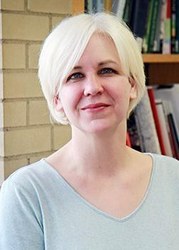
The next U.S. census won’t happen until 2020, but it’s already a hot topic of conversation as controversy builds over a proposed question on citizenship.
Jennifer Van Hook, Roy C. Buck Professor of Sociology and Demography in the College of the Liberal Arts, recently discussed the implications of the citizenship question and the work that goes into designing and implementing new census questions on the McCourtney Institute for Democracy’s Democracy Works podcast.
Van Hook served on the Census Advisory Board from 2007 to 2011 and is an expert on how census data is collected, how it’s evaluated and how it’s used.
In a time when every aspect of government seems to be polarized and politicized, the U.S. Census Bureau is fighting to maintain its sense of rigor and objectivity, Van Hook said, despite the fact that it does not currently have a director and is understaffed in other areas.
“For every single number that you might see in a report, there might be 60 or 70 different statistical tests that have been done to make sure that that number is accurate,” Van Hook said. “Then the reports themselves are devoid of any kind of interpretation. They're just describing the numbers and the accuracy of those numbers.”
Van Hook worries that the addition of a question about citizenship might sow feelings of distrust about the census among immigrants and impact their level of participation.
“When you don't have that opportunity to really build that trust, I think what you're going to end up seeing is a lot of people not trusting in the census and not really wanting to participate,” Van Hook said.
The Democracy Works podcast launched in March and new episodes are released each Tuesday. Previous episodes include congressional investigations with Political Science Professor Doug Kriner and a conversation about the future of U.S. democracy with Daniel Ziblatt, author of “How Democracies Die.” Listen at democracyworkspodcast.com or in iTunes.